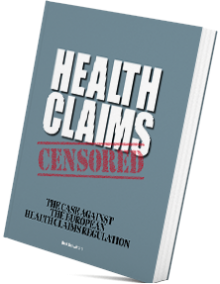In defense of the necessity of the Nutrition and Health Claims Regulation (NHCR), the health foods market that existed before the legal prohibition of all health claims entered into force is often qualified as a “jungle.” A “jungle” so full of venomous and treacherous business operators, that the blackout of all claims, the deconstruction of the freedom of speech and installment of complete control by the European Union sounds quite proportionate and reasonable.
In a genuine market system, order is maintained by the rule of law. Market participants, producers and consumers, as well as the government must pay respect to laws and regulations. Conflicts are sorted out by courts of law, which must decide on the basis of applicable legal rules and regulations. No one is above the law. No one is denied access to the law and the fundamental freedoms. Consumers and competent business operators can seek redress against misleading or fraudulent commercial information. Governments must apply the law to protect consumers and honest business operators against swindlers and racketeers.
In the pre-NHCR situation, numerous national and European laws, regulations and provisions were enacted to maintain order in the food market. With regard to health claims used in commercial communication, the European Food Labeling Regulation 2000/13/EC explicitly stated in Article 2(1)(b) that such claims “must not be such as could mislead the purchaser to a material degree, …, by attributing to the foodstuff effects or properties which it does not possess.” (i)
In the broader legal context of protecting consumers against misleading information, European law and case law provided and still provide that acts that mislead consumers are prohibited. Explicit and unequivocal rules can be found for instance in Directive 2005/29/EC concerning unfair business-to-consumer commercial practices and Directive 2006/114/EC concerning misleading and comparative advertising.
In Article 6 of Directive 2005/29/EC, an “action” (“commercial practice”) is regarded as misleading: “[…] if it contains false information and is therefore untruthful or in any way, including overall presentation, deceives or is likely to deceive the average consumer, even if the information is factually correct, in relation to one or more of the following elements, and in either case causes or is likely to cause him to take a transactional decision that he would not have taken otherwise: the main characteristics of the product, such as its […], benefits, risks, […], fitness for purpose, usage, […] or the results to be expected from its use, or the results and material features of tests or checks carried out on the product.” Health claims clearly fell under this Article.
Directive 2006/114/EC provides under Article 3: “In determining whether advertising is misleading, account shall be taken of all its features, and in particular of any information it contains concerning: the characteristics of the goods or services, such as their [… ] fitness for purpose, uses, […] or the results to be expected from their use, or the results and material features of tests or checks carried out on the goods or services.” Health claims clearly fell under this Article.
So, the rule of law system provided and still provides ample, sufficient and appropriate instruments that made and still make it possible to maintain order in the “health claims market” in the interest of consumers and business operators alike. If there existed irregularities, they were caused by incompetent Member States, unwilling, hesitant or incapable to maintain the laws and regulations designed to protect consumers as well as honest business operators against unfair and misleading practices. If consumers were underserved, so were honest business operators.
In the seminal case Gut-Springenheide (Case C-210-96 (ii)), which was dealt with by the EU Court of Justice (ECJ) in 1996, the Advocate General Jean Mischo defined “information that is objectively correct” as “information that is in conformity with the truth.” When information is objectively correct but does not reflect the whole of reality, the consumer is being misled “when the part of the information omitted were to shed a completely different light on the part of the information provided.” So, information is objectively correct when it is in conformity with the truth and when it reflects all there is to know.
In the NHCR, the EU legislature did not describe this situation as a “jungle” that was in urgent need of reform. In recital 2, the reason given for the necessity of adopting the Regulation was the existence of “differences between national provisions” relating to such nutrition and health claims, that “may impede the free movement of foods and create unequal conditions of competition.” It wasn’t that these national provisions were ineffective or insufficient. No. According to the European legislature, the provisons simply differed from each other.
One wonders, what national differences the legislature had in mind. Under the combined rules of European Regulation 2000/13/EC, European Directive 2005/29/EC and European Directive 2006/114/EC, which – respectively – conclusively harmonized “the laws of the Member States relating to the labelling, presentation and advertising of foodstuffs,” provisions concerning “unfair business-to-consumer commercial practices in the internal market” and “misleading and comparative advertising,” there were no different national provisions remaining in the area of regulating health claims.
In the ECJ case C-221/00, brought by the Commission to stop Austria’s practice of subjecting health claims to an NHCR-type pre-approval system, Advocate General Geelhoed concluded that this administrative practice, indeed, the same practice adopted in 2006 by the European legislature in the NHCR, had to be regarded as a provision that fell within the scope of the food labelling Directive. (iii) Meaning that health claims were conclusively regulated throughout the European Union. There were no remaining national differences.
In this case, the Court confirmed that “by laying down a general prohibition of health-related information on the labelling of foodstuffs for general consumption and by subjecting the display of such information to a prior authorisation procedure, the Republic of Austria has failed to fulfil its obligations under […] Directive 79/112/EEC […] on the approximation of the laws of the Member States relating to the labelling, presentation and advertising of foodstuffs, […].” (iv) In other words, health-related information was regulated under Article 2(1)(b) of Directive 79/112/EEC (succeeded by Article 2(1)(b) in Regulation 2000/13/EC).
In this fully harmonised situation, differences existed nevertheless, but they were caused by stubbornly recalcitrant Member States that were unwilling to apply the relevant European Directives and Regulations.
Regretfully, like a giant tectonic plate, the “complement” to the Food Labelling Regulation slid over and annihilated the Union’s own harmonized provisions. In one cosmic sweep, the rule of law was replaced by the “rule of science.” All of a sudden, health claims had to be substantiated by “generally accepted scientific evidence” and subjected to “a scientific assessment of the highest possible standard.” The dictate of “science” was substituted for the rule of law, for legal evidence and for legal assessment of the evidence. Scientists took the seats of judges.
Since the rule of law differs from the rule of science, the tectonic shift caused by the European legislature created a total blackout of health claims, including those permitted and perceived as truthful under the rule of law. In the NHCR, the legislature correctly describes this blackout as follows: “Health claims shall be prohibited unless they […] are authorised in accordance with this Regulation and included in the lists of authorised claims provided for in Articles 13 and 14.” (v) Authorization can only take place in case health claims are “based on and substantiated by generally accepted scientific evidence.” (vi)
The shift effectively demolished the edifice of the rule of law that had been built stone by stone in the long traditions of the Member States. It even demolished the edifice of European regulations built by approximating the legal provisions of the Member States. With the rule of law went the market system for food products carrying health claims. The market mechanism was effectively replaced by a system designed to fulfill government-established priorities and the creation of the necessary bureacratic apparatus.
Since health claims are now public goods, they no longer form part of the internal market, even though they may be used in commercial communication. Health claims have become tools in the bureaucratic management of information aimed at withholding or providing information in line with priorities and desires set by politicians, bureaucrats, consumer advocates, anti-industry and anti-market agitators. There is no more market, not even an internal market. All that is left for food business operators is the task to provide the justification (substantiation) of the claim and carry the costs of the justification. (vii)
Under the rule of law, expert evidence plays an important role. After all, an intelligent and reliable evaluation of facts is often difficult or impossible without the application of some scientific, technical, or other specialized knowledge. The most common source of this knowledge is “the expert.” Experts need not necessarily be scientists. Skilled gardeners, millers, mechanics, cooks, sculptors, housewives, sculptors, business operators, farmers, etc. are experts whose expertise does not necessarily depend on scientific training and/or university degrees.
Experts are relied upon to assist the authorities and the judiciary in making determinations regarding the truthfulness, correctness and completeness of the facts in the context of applicable regulations. For instance, in the European Medicines Directive (2001/83/EC), “experts” are qualified to produce “expert evidence to the effect that the medicinal product in question, or a corresponding product has been in medicinal use throughout a period of at least 30 years preceding the date of the application, including at least 15 years within the Community.”
In addition to the assessment of “medicinal use,” the experts shall assess whether “the data on the traditional use of the medicinal product are sufficient; in particular the product proves not to be harmful in the specified conditions of use and the pharmacological effects or efficacy of the medicinal product are plausible on the basis of long-standing use and experience.” In the absence of pharmacological evidence, the expert shall assess the plausibility of the pharmacological effect on the basis of long-standing medicinal use and experience. It is here that the rule of law still has an important place in the Medicines Directive.
Under the rule of science, i.e. under the rule of the NHCR, such “expert evidence” plays no role whatsoever. It was replaced by “scientific substantiation” that requires “an evaluation of the highest possible standard” before it can be qualified as meeting the “generally accepted” standard. In the case of health claims, the European Food Safety Authority (EFSA), does not produce the evidence. It only evaluates – judges – the evidence produced by colleague scientists and presented by applicant food business operators.
It is this particular and explicit choice for scientificsubstantiation and scientific evaluation of the substantiation, that prohibits – makes impossible – the evaluation of expert evidence demonstrating plausibility of health effects on the basis of long standing nutritional use and experience. Even if EFSA’s evaluators would be inclined to accept a traditional health claim, the absence of scientific substantiation prohibits the acceptation.
By allowing therapeutic claims based on traditional use for medicinal products, the European legislature has accepted and acknowledged that, under the rule of law, expert evidence can produce information that is not misleading or false, unambiguous, objectively correct and representing “toute la réalité.” With regard to the provision that European regulations must provide a “high level of protection,” especially for consumers, “expert evidence” regarding information based on traditional use is supposed to reach and produce levels of certainty and protection equal to the level of certainty and protection supposedly reached by “scientific substantiation.”Consumers are sufficiently protected when the expert evidence is unbiased and based on adequate facts.
The problem is that the scientific basis on which the NHCR was erected leaves no room for health claims based on traditional use. As the Commission observed in its 2012 Discussion Paperon claims based on the traditional use of “botanicals”: “[b]ecause of the consideration given by EFSA to the evidence related to ‘traditional use’, no claim on botanicals based on this kind of evidence alone has obtained a positive assessment so far. On the contrary, […], evidence of traditional use is given a different consideration in the case of THMPs [Traditional Herbal Medicinal Products].” Let me add that under the rule of science no claim on any foodstuff based on this kind of evidence will obtain a positive assessment.
In the words of the Commission: “Considering that the different requirements in these two areas of EU law can lead to important differences in the level of information that is provided to consumers on products apparently similar, the Commission decided to launch a reflection on whether this difference should be maintained or not.”
Allow me to rephrase this statement as follows: Considering that the different requirements in the area of EU law and the area of science lead to important differences in the level of information that is provided to consumers, we must reflect on whether this difference should be maintained or not.”
I hope that this is what the ENVI Committee of the European Parliament had in mind when it called on the Commission to “review the scientific basis of this regulation (NHCR) and how useful and realistic it is.”
(i) Directive 2000/13 was repealed with effect 13 December 2014 and replaced by the Food Information Regulation 1169/2012, which provides under Article 7: “Food information shall not be misleading, particularly: (a) as to the characteristics of the food and, in particular, as to its nature, identity, properties, composition, quantity, durability, country of origin or place of provenance, method of manufacture or production; (b) by attributing to the food effects or properties which it does not possess; […]”
(ii) Affaire C-210/96; Gut Springenheide GmbH, Rudolf Tusky contra Oberkreisdirektor des Kreises Steinfurt – Amt für Lebensmittelüberwachung soutenue par Oberbundesanwalt beim Bundesverwaltungsgericht.
(iii) See #41 in the Advocate General’s Opinion. In this case, the Austrian practice was assessed in the context of Directive 79/112, which preceded the Food Labelling Regulation 2000/13/EC.
(iv) Judgment of the Court of 23 January 2003 in Case 221/00
(v) Article 10.1 of the NHCR.
(vi) Article 6.1 of the NHCR.
(vii) Article 6.2 of the NHCR.




